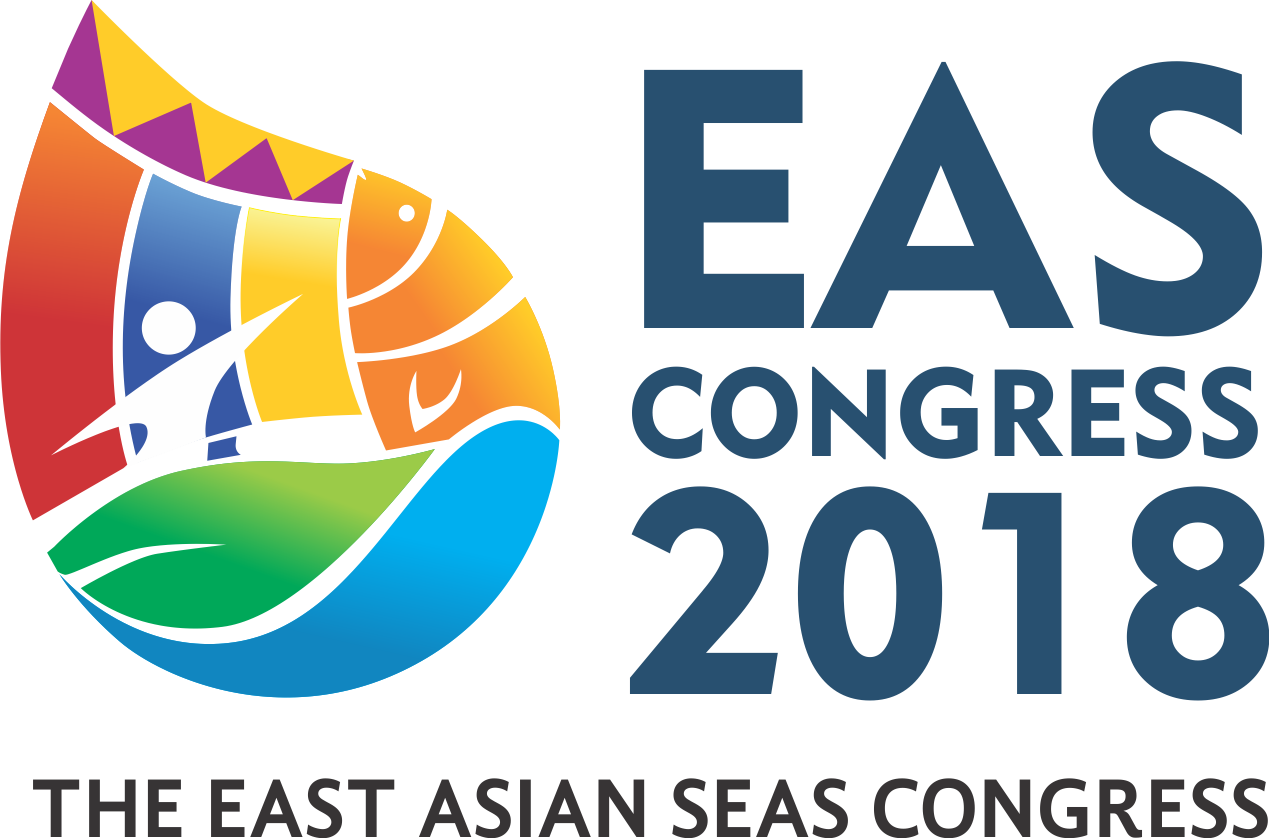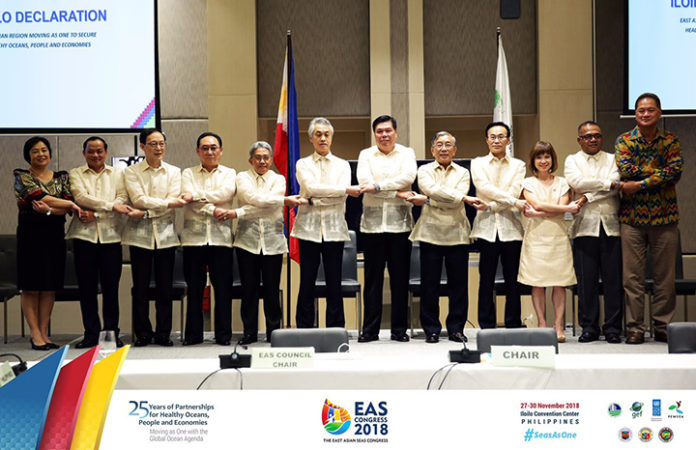Various stakeholders strengthened their commitments to better manage the coastal and marine environment and resources as the East Asian Seas (EAS) Congress 2018 ended on a high note in Iloilo City on November 30.
Carrying the theme, “25 Years of Partnerships for Healthy Oceans, People and Economies: Moving as One with the Global Ocean Agenda,” the EAS Congress 2018 was attended by over 1,000 delegates from 11 countries in the East Asian region.
The event was capped by the signing by environmental ministers of participating countries of the Iloilo Ministerial Declaration, titled “East Asian Region Moving as One to Secure Healthy Oceans, People and Economies.” It was hosted by the Philippines government and organized by the Department of Environment and Natural Resources (DENR) and Partnerships in Environmental Management for the Seas of East Asia (Pemsea).
Thumbs up
Environmental and conservation advocates lauded the country’s hosting of the event and underscored the importance of protecting and conserving the seas of East Asia.
Sought for reaction, AA Yaptinchay, director of the Marine Wildlife Watch of the Philippines, which seeks for the conservation of marine wildlife and their ecosystems, said coastal and marine environment is now less protected.
“It is critical that the coastal and marine ecosystems are given importance and attention in our quest for a more sustainable future. It will take a global village to manage the human activities causing problems and the East Asian region. [The EAS Congress] declaration is a welcome effort, a commitment for bigger steps and actions to take place,” Yaptinchay said in a message sent to the BusinessMirror via Messenger on December 3.
John Leo Algo, science policy associate of The Climate Reality Project Philippines, said oceans are vital to the survival of humanity, especially in Southeast Asia.
“Given the current challenges facing the health of marine and coastal ecosystems, the most threatening of which are climate change and plastic pollution, dealing with both their impacts and root causes is more urgent now than ever,” Algo said.
He added that the Iloilo ministerial declaration for ocean resource conservation and sustainable development is a “step in the right direction” for the welfare of current and future generations.
“However, it is necessary to recognize that the well-being of marine and coastal life should be just as big of a focus as that of human societies. The link between man and oceanic life must be harmonized in a way that allows both to survive and thrive in a changing world,” He also said in a message.
Systematic, institutionalized destruction
For his part, Fernando Hicap, chairman of Pambansang Lakas ng Kilusang Mamamalakaya ng Pilipinas, said: “International formations like the one held in Iloilo where protection and management of seas were discussed is very crucial these days where systematic and institutionalized destruction of marine resources are prevalent.”
People in coastal communities, particularly small fisherfolk are the ones who suffer from marine environmental catastrophe caused by rampant activities, Hicap said.
“[A] clear example is the diminishing fish catch in the municipal waters, which dramatically drops to 3 kg [kilograms] to 5 kg per fishing trip from 10 kg to 15 kg when fishing waters were still abundant,” he cited.
“Seagrasses, mangroves and corals are being destroyed [and converted into] tourist destinations, industrial and commercial hubs. The massive conversion of our waters poses impacts not only to the marine and aquatic resources but also to the livelihood of small fishers,” Hicap, a former party-list representative, told the BusinessMirror via a social-media message last week.
Leon Dulce, national coordinator of Kalikasan-People’s Network for the Environment, expressed hope that the Iloilo Ministerial Declaration will result into concrete national and intergovernmental actions on the tough transboundary marine issue in the South China Sea conflict.
“The declaration should translate into the negotiated establishment of South China Sea as an international marine peace park to facilitate the demilitarization and regional cooperation to conserve the important marine body,” he said.
Dulce explained: “The ecological health of East Asia’s oceans is interlinked with the South China Sea. If China’s island building, military activity and tolerance of poaching and other illegal fishing practices in the South China Sea persist, we are accelerating the degradation of all our seas.”
SDS-SEA key component
At a news conference to cap the four-day event, Environment Secretary Roy A. Cimatu, in a message read by Environment Undersecretary and Chief of Staff Rodolfo C. Garcia, expressed gratitude to the ministers representing 11 countries for affirming their commitment to previous agreements for the Seas of East Asia through the Iloilo Ministerial Declaration.
A key component of Pemsea regional mechanism that provides policy direction and commitment for improving and strengthening the Sustainable Development Strategies for the Seas of East Asia (SDS-SEA), the declaration was signed by Cambodia, China, Indonesia, Japan, Lao PDR, North Korea, Singapore, South Korea, Timor-Leste, Vietnam and the Philippines.
Cimatu, who was in Katowice, Poland, for the 24th Conference of Parties to the United Nations Framework Convention on Climate Change, urged the 11 countries to implement programs based on the commitment they signed under the declaration.
Sixth EAS Congress
Aimee Gonzales, executive director of Pemsea, said the declaration was the outcome of the congress’s sixth Ministerial Forum on November 29.
Previous EAS congresses were held in Malaysia in 2003, China in 2006, the Philippines in 2009, South Korea in 2012 and Vietnam in 2015.
A triennial conference, the regional event provides a dynamic platform for knowledge sharing, collaborative action, partnership building and a forum for advance commitment and cooperation in achieving the shared vision of a sustainable East Asian Seas.
The congress has established its reputation as an intellectual marketplace and ocean-based forum that uniquely focuses on the world’s most diverse and fastest-growing region.
It aims to address ocean and coastal-area degradation through the sustainable management and use of marine resources, seas and oceans.
Significant milestones
Gonzales said some of the milestone achieved during past EAS Congresses include the following:
The Declaration of Regional Cooperation for the SDS-SEA framework was agreed upon in Putrajaya, Malaysia, in 2003.
The ministers agreed on the implementation of the SDS-SEA, based on the implementation strategy developed during the EAS Congress in Haikou City, China, in 2006.
The ministers committed to strengthening the implementation of Integrated Coastal Management (ICM) for sustainable development and climate-change adaptation in Manila in 2009.
The ministers agreed to work toward ocean-based economy or “blue economy” in Changwlon, South Korea, in 2012.
The ministers committed to work for the achievement of the United Nations Sustainable Development Goals (SDGs), collectively as a region during the congress in Danang, Vietnam, in 2015.
Iloilo Declaration key components
Gonzales said the Iloilo Ministerial Declaration has three significant components, namely: on common understanding and shared beliefs; commitment in the next five years; and strengthening partnerships.
A reaffirmation of past commitments, the environmental ministers acknowledged significant values and contributions of coastal and marine ecosystem services. The ministers committed to transform Pemsea to a self-sustaining regional organization.
“Under the Iloilo Declaration, the ministers recognized Pemsea’s pioneering work to develop best practices in the design and implementation of [ICM],” she said.
Other common understanding and shared beliefs include the commitment to support the region in the effective implementation of the SDS-SEA aligned with the UN SDGs and other international or regional commitments; and encourage the region to move toward a blue economy, sustainable development of its coasts and oceans.
According to Gonzales, a very important part of the Iloilo Ministerial Declaration is their conclusion that the biggest threat in the region is the people, the way they live their lives and the way they manage resources.
Partially, the declaration states: “We…strongly urge everyone to shift toward a mindset of responsible stewardship, and pledge to take bold steps to protect, manage and restore our coasts and oceans for our present and future generations.”
According to Gonzales, citing the document, Pemsea Country Partners are ready to engage citizens in East Asia and peoples in our regions to work together to secure our shared vision of healthy oceans, people and economy.
“This is not the problem of the government alone. We all have to do our part,” she said.
Youth forum
Antonio L. Lavina, chairman of the East Asian Seas Partnership Council, said another significant milestone in the EAS Congress 2018 was the parallel event where 70 youth leaders from 13 countries have affirmed their support for the sustainable development of the seas of East Asia.
The event paved the way for the launching of the Pemsea Youth Program.
During a breakout discussion, the young delegates shared their suggestions toward the improvement of the program.
Lavina said he was impressed by the youth’s knowledge of the issues confronting the seas of East Asia, as well as their conviction and commitment as they also came up with their own declaration.
“Their passion, their level of knowledge on ocean issues, on environmental issues…. it is very high,” he said, adding that the youth’s participation in the Iloilo events gives a breath of new hope for the protection and conservation of the coastal and marine environment and natural resources East Asia.
“The youth matters the most because they will inherit the Earth. The nature of ocean challenges is intergenerational,” he said.
According to Lavina, the Youth Council will work closely with Pemsea for the implementation of various programs in East Asia.
Way forward
Analiza Teh, environment undersecretary for Climate Change and Mining Concerns, said in the Philippines, the DENR will continue to implement various coastal and marine management programs.
She said the DENR is also hoping to access the Green Climate Fund for the implementation of ICM programs in eight priority provinces that have been identified based on population, poverty threshold and vulnerability to climate change.
“Actually, there are 22 vulnerable provinces, but for 2019, we will focus on eight provinces,” she said.
The eight priority provinces are Samar, Negros Oriental, Saranggani, Surigao del Norte, Surigao del Sur, Dinagat Islands, Sorsogon and Masbate.
Gonzales said Pemsea will continue to provide various support to its network of local government units in East Asia, including funding programs and projects, in line with the commitments in implementing ICM and in the development of the region’s “blue economy” toward the achievement of the UN SDGs.
Image Credits: DENR-SCIS
Published in Business Mirror.

